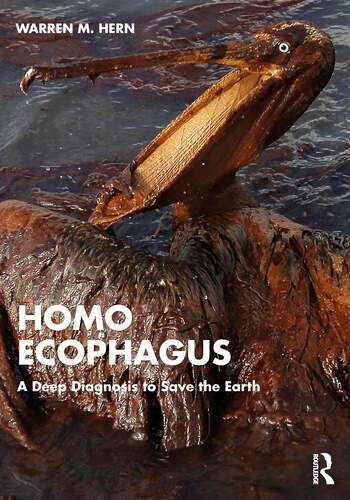
“At the moment,” writes Warren Hern, “we are the most misnamed species on the planet: Homo sapiens sapiens—’wise, wise man.’ Not.”
Hern, 84, physician and adjunct professor of anthropology at the University of Colorado Boulder, thinks the name he coined for his new book provides a much more accurate description of humanity in the 21st century.
“I propose that the new scientific name of the human species be Homo ecophagus … ‘the man who devours the ecosystem,'” he writes in “Homo Ecophagus: A Deep Diagnosis to Save the Earth” (Routledge, 2022). “Homo ecophagus is a rapacious, ubiquitous, predatory, omni-ecophagic species that is a malignant epiecopathologic process engaged in the conversion of all plant, animal, organic and inorganic planetary material into human biomass or its adaptive adjuncts and support systems.”
“Maybe we are not god’s gift to creation, the flower of the universe,” Hern muses. “Maybe we are something much, much worse: a malignant process on the Earth.”
Finally, he renders his grim diagnosis: humanity is a cancer, and that’s neither hyperbole, metaphor nor analogy, he argues. Hern notes, for example, that cities, like cancer:
- Invade and destroy adjacent normal tissues (i.e., ecosystems);
- Metastasize to ever more distant locales;
- Are progressive (i.e., growing); and
- Resistant to death.
Citing several further similarities, he concludes that, “Human communities and human activities in general are ecophagic: they devour the ecosystem.”
“Rapid, uncontrolled growth is the sine qua non of cancer. As long as the human population is growing at all, there is no hope of solving these major ecological problems,” he says. “All the rest is secondary stuff.”
He notes that while the rate of global population growth has dropped from about 2% a year in the mid-20th century to 1% per year in the third decade of the 21st century, even at half the rate, humanity continues to grow along a “logistic, or asymptotic curve, which is the same growth curve seen in malignancies” and that “the declining growth rate of cancer occurs just before death of the host organism.”
“We are conducting the Anthropocene Extinction Event, and we are on our way to becoming casualties of it. Soon,” he writes. “Is that our goal?”